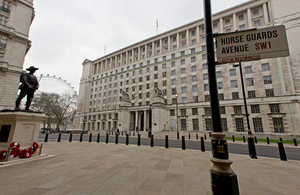- Successful programme to support vulnerable families launches its next phase, backed by £165 million in funding for 2021 to 2022.
- Over 400,000 vulnerable families supported to build brighter futures since 2015.
- Number of children going into care reduced through the programme, and the number of adults going to prison.
- New additional £7.9 million fund launched to improve how councils use data to support families, including by providing key workers with the information that they need.
The next phase of the government’s flagship programme to support some of the most vulnerable families in society has been launched by Housing Secretary Robert Jenrick today (26 March 2021), backed by £165 million funding.
The newly named ‘Supporting Families’ programme, previously known as the ‘Troubled Families’ programme, includes work to support people to leave abusive relationships, get the right joined-up support for those with mental health issues and help people to find work – all part of the government’s comprehensive programme of work to support and unite communities.
Through the programme, which began in 2012 – families are assigned a dedicated keyworker, who works with every member of the family and brings local services together to resolve issues at an early stage, before they develop into more significant problems.
Since 2015, over 400,000 vulnerable families have received support to help them turn their lives around and build brighter futures, and over 870,000 families have benefited from the programme’s ‘whole family’ approach to tackling problems.
The programme has delivered significant results while reducing costs of services for the taxpayer – with the proportion of children supported by the programme going into care reduced by a third and the proportion of adults going to prison reduced by a quarter.
Housing Secretary, Rt Hon. Robert Jenrick MP said:
Working hand in hand with local councils and other partners we have helped over 400,000 vulnerable families.
For the next phase, Supporting Families will continue this important work backed by £165 million funding to help families with multiple complex problems to overcome difficulties as early as possible. It is a critical part of our moral mission to tackle intergenerational unemployment, crime, domestic abuse and family breakdown.
As we come out of the COVID-19 pandemic it is more important than ever we support families. The last year has shown what can be achieved if different agencies act as one and wrap their arms around the most vulnerable. That is the objective of Supporting Families, the renewed programme to turn around lives and help families to achieve their potential.
Eddie Hughes MP, Minister for Housing and Rough Sleeping said:
The government is supporting the most vulnerable in our communities and the Supporting Families programme will help us to make lasting change to many more lives”.
By working with every member of a family and bringing local services together, Supporting Families keyworkers get to the heart of the multiple and connected difficulties many families face and tackle them early – overcoming obstacles before they develop into something more serious and reducing the cost of services to the taxpayer.
During the pandemic, services funded by the programme played a vital role in helping families, providing access to food and equipment for children home learning. To continue to build relationships and ensure families were supported during lockdown, local areas introduced virtual meetups and garden or doorstep visits, within the social distancing guidelines and restrictions.
Building stronger data is key focus of the next phase of the programme, and the government today announced the launch of a new Data Accelerator Fund, backed by £7.9 million in additional funding, to improve how councils use data to support vulnerable families.
This includes identifying families that need support and helping frontline workers get the information they need. Councils will be able to bid for this funding, split over two years, to set up new data projects.
The government has today also published research on a £9.5 million Supporting Families Against Youth Violence fund, which supported 21 areas to run projects combatting knife crime between 2018 and 2020. The research showed that a whole family approaches were seen as effective in preventing youth crime.
The programme, previously named the ‘Troubled Families programme,’ will now be known as ‘Supporting Families’, to better reflect the role that keyworkers play.
The first phase of the Troubled Families programme ran from 2012-2015 and was the first national programme aimed at driving real change in outcomes for families with multiple problems and changing how services worked with them.
The second phase of the programme ran from 2015-2021 and built on this work, but was co-designed with councils to allow a more flexible approach to be taken in each area.
401,709 families reported successful outcomes since 2015. Please see further information in the Troubled Families annual report 2020 to 2021
View the national review of the Troubled Families programme, covering 2015-2020.
Cost benefit analysis from 2019 suggest that the programme has reduced demand on high cost acute services such as child protection, police and criminal justice services – a key goal of the programme.
See more information about the new Data Accelerator Fund.


